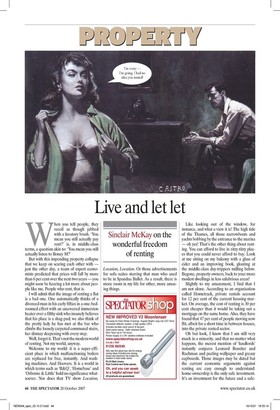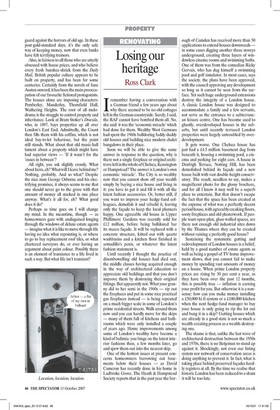Sinclair McKay on the wonderful freedom of renting
When you tell people, they recoil as though jabbed with a lavatory brush. 'You mean you still actually pay rent?' is, in middle-class terms, a question akin to: 'You mean you still actually listen to Boney M?'
But with this impending property collapse that we keep on scaring each other with — just the other day, a team of expert economists predicted that prices will fall by more than 6 per cent over the next two years —you might soon be hearing a lot more about people like me. People who rent, that is.
Twill admit that the image of renting a flat is a bad one. One automatically thinks of a divorced man in his early fifties in a one -bedroomed effort with an uncovered immersion heater over a filthy sink who insanely believes that his place is a shag-pad; we also think of the pretty lady he has met at the bar who climbs the loosely carpeted communal stairs, her dismay deepening with every step.
Well, forget it. That's not the modern world of renting. Not my world, anyway.
Welcome to my world: it is a super-efficient place in which malfunctioning boilers are replaced for free, instantly. And washing machines. And Hoovers. It is a world in which terms such as `B&Q', `Homebase' and 'Osborne & Little' hold no significance whatsoever. Nor does that TV show Location, Location, Location. Or those advertisements for sofa suites starring that man who used to be in Spandau Ballet. As a result, there is more room in my life for other, more amusing things.
Like looking out of the window, for instance, and what a view it is! The high tide of the Thames, all those narrowboats and yachts bobbing by the entrance to the marina — oh yes! That's the other thing about renting. You can afford to live in ritzy-titzy places that you could never afford to buy. Look at me sitting on my balcony with a glass of cider and an improving book, gloating at the middle-class day-trippers milling below. Begone, property-owners, back to your more modest dwellings in less salubrious areas!
Slightly to my amazement, I find that I am not alone. According to an organisation called Hometrack, private rentals account for 12 per cent of the current housing market. On average, the cost of renting is 30 per cent cheaper than it would be taking out a mortgage on the same home. Also, they have found that 47 per cent of people moving now flit, albeit for a short time in between houses, into the private rented sector.
Oh but look, I know that I am still very much in a minority, and that no matter what happens, the merest mention of 'landlords' instantly conjures Leonard Rossiter and Rachman and peeling wallpaper and greasy cupboards. Those images may be dated but the current economic arguments against renting are easy enough to understand: home-ownership is the only safe investment. It's an investment for the future and a safeguard against the horrors of old age. In these post-gold-standard days, it's the only safe way of keeping money, now that even banks have felt terrifying tremors.
Also, in fairness to all those who are utterly obsessed with house prices, and who believe every fresh banshee-shriek from the Daily Mail, British popular culture appears to be built on property, and has been for some centuries. Certainly from the novels of Jane Austen onward, it has been the main preoccupation of our favourite fictional protagonists. The houses alone are imposing characters: Pemberley, Manderley, Thornfield Hall, Wuthering Heights. The root of all melodrama is the struggle to control property and inheritance. Look at Bram Stoker's Dracula, who, in 1897, buys properties up all over London's East End. Admittedly, the Count then fills them with his coffins, which is not ideal buy-to-let behaviour, but the point still stands. What about that old music-hall lament about a property which might have had superior views — 'If it wasn't for the 'ouses in between'?
All right, you ask slightly crossly. What about heirs, eh? What will I leave behind me? Nothing, probably. And so what? Despite the nice man George Osborne and his electrifying promises, it always seems to me that one should never go to the grave with that amount of money all stacked in one place anyway. What's it all for, eh? What good does it do?
Perhaps as time goes on I will change my mind. In the meantime, though — as homeowners gaze with undisguised longing through the windows of deluxe estate agents — imagine what it is like to move through life having no idea what repointing is, or where to go to buy replacement roof tiles, or what chartered surveyors do, or ever having an argument about paint colour. Possibly there is an element of transience to a life lived in such a way. But what life isn't transient?








































































 Previous page
Previous page